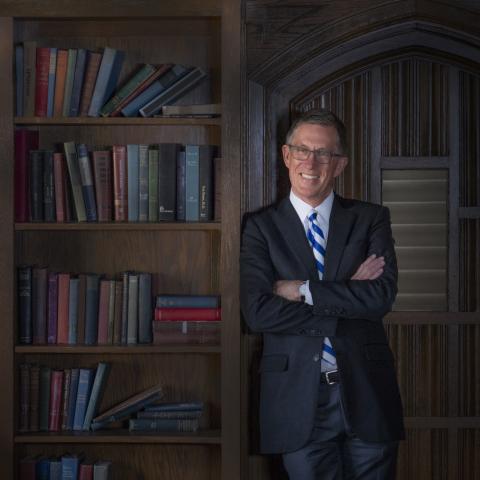"Gregg has always understood the value of an engaged faculty and the role it plays in helping students—and the University—learn and develop. His emotional intelligence and authenticity have garnered him respect across campus. And as the architect of our budget and the steward of a rigorous academic culture, Gregg has maintained our core focus on students.”
None of that has been easy. When Kvistad arrived on campus in 1984, fresh from a two-year stint at Wellesley College and an appointment as a research affiliate at Harvard University's Center for European Studies, he found himself in a setting steeped in uncertainty. At that time, the institution was contending with budget deficits and shrinking enrollments.
“I do remember being told that there was a good chance I would lose my job,” Kvistad says. “That was literally within a week of arriving. I had lunch with the chair of the economics department who said, ‘This isn’t looking real good for faculty who were just hired.’”
And not long afterward, he recalls, “There were faculty members who were bought out of their contracts.”
To his relief, Kvistad was not among them. Through the following years—in which “people [were] working really, really hard to try to right this ship”—Kvistad ventured into different roles, moving into an administrative leadership position in 1992 as chair of the political science department. With this change, he shifted focus from his own teaching and research to giving faculty the support, and freedom, to innovate in the classroom and to advance knowledge through research.
Later, as dean of Arts, Humanities and Social Sciences, he championed the Marsico Initiative, a faculty-driven campaign aimed at intensifying undergraduate education in the arts and sciences. It resulted, among other things, in creation of DU’s celebrated Writing Program and launching of the University’s first-year seminars, two programs essential to the undergraduate experience.
Kvistad’s tenure as provost—characterized by what history professor Susan Schulten calls his “humility, sense of perspective and humor, and openness”—earns kudos from the faculty. Schulten, for one, credits him with demystifying the University’s inner workings and giving faculty members the context they need to support the institution’s priorities.
“He has done quite a bit to bring the faculty into the governance and to help us understand the operation of the institution. In 2012, for instance, he made the laudable step of holding quarterly meetings with the faculty to review the University’s budget, institutional plans, projections on undergraduate and graduate enrollment, updates on the endowment, resource allocation, and our position relative to our peer and aspirational institutions,” Schulten explains. “These are invariably helpful meetings, and Gregg makes time for them each quarter. That says something about his commitment to keeping the faculty in the loop and addressing our concerns.”
Kvistad leaves the provost’s post with a record of attending to faculty concerns and elevating their academic priorities. That’s just what he set out to do in 2006 when he assumed the job. Since then, under his leadership, the University has increased its faculty by over 247 new full-time positions. He has also hired all of the University’s current deans.
“Much of academic leadership is about empowering the faculty, encouraging them and their extraordinary capacities—academic and intellectual—to lead the University forward,” he says. “That’s what I’ve tried to do in every one of [my] positions.”
Only one academic experience remains on his “try that” list: “I’ve never had a sabbatical in my life,” he says. “It sounds slightly terrifying.”
After several months of sabbatical, Kvistad will move to an office in the engineering and computer science building, and, along with several academic pursuits, he will help prepare for the University’s forthcoming comprehensive fundraising campaign.
A reception celebrating Kvistad’s academic leadership is scheduled from 3:30 to 5 p.m. Thursday, May 31, in the Anderson Academic Commons, room 290








